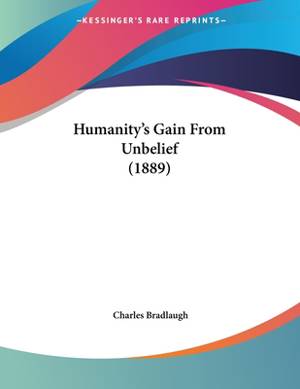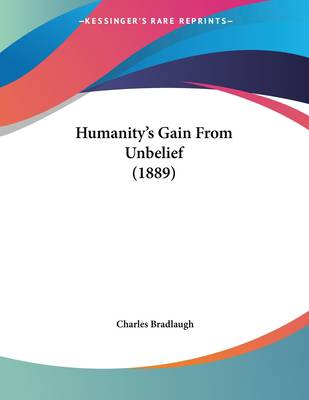
- Retrait gratuit dans votre magasin Club
- 7.000.000 titres dans notre catalogue
- Payer en toute sécurité
- Toujours un magasin près de chez vous
- Retrait gratuit dans votre magasin Club
- 7.000.0000 titres dans notre catalogue
- Payer en toute sécurité
- Toujours un magasin près de chez vous
Description
Humanity's Gain From Unbelief is a book written by Charles Bradlaugh in 1889. Bradlaugh was a British political activist and atheist who was known for his advocacy of free speech and secularism. In this book, he argues that unbelief, or atheism, is not only a valid belief system but also one that can benefit humanity in numerous ways.Bradlaugh begins by examining the history of religion and the role it has played in human society. He argues that religion has often been used as a tool of oppression, and that it has been responsible for countless wars and conflicts throughout history. He also argues that religion has held back scientific progress and hindered the development of human knowledge.In contrast, Bradlaugh sees unbelief as a liberating force that can free individuals from the constraints of religion and allow them to think for themselves. He argues that atheism encourages critical thinking and rational inquiry, which are essential for scientific progress and social progress.Furthermore, Bradlaugh believes that unbelief can lead to a more ethical and compassionate society. He argues that without the fear of divine punishment, individuals are free to act according to their own conscience and to develop a sense of empathy and compassion for others. He also argues that unbelief can promote social justice and equality, as it encourages individuals to question the status quo and challenge oppressive systems of power.Overall, Humanity's Gain From Unbelief is a passionate defense of atheism and a call to action for those who seek a more just and equitable society. Bradlaugh's arguments are still relevant today, and his book remains a powerful and thought-provoking read for anyone interested in the intersection of religion, politics, and ethics.This scarce antiquarian book is a facsimile reprint of the old original and may contain some imperfections such as library marks and notations. Because we believe this work is culturally important, we have made it available as part of our commitment for protecting, preserving, and promoting the world's literature in affordable, high quality, modern editions, that are true to their original work.
Spécifications
Parties prenantes
- Auteur(s) :
- Editeur:
Contenu
- Nombre de pages :
- 20
- Langue:
- Anglais
Caractéristiques
- EAN:
- 9781104094508
- Date de parution :
- 16-02-09
- Format:
- Livre broché
- Format numérique:
- Trade paperback (VS)
- Dimensions :
- 216 mm x 279 mm
- Poids :
- 90 g

Les avis
Nous publions uniquement les avis qui respectent les conditions requises. Consultez nos conditions pour les avis.






